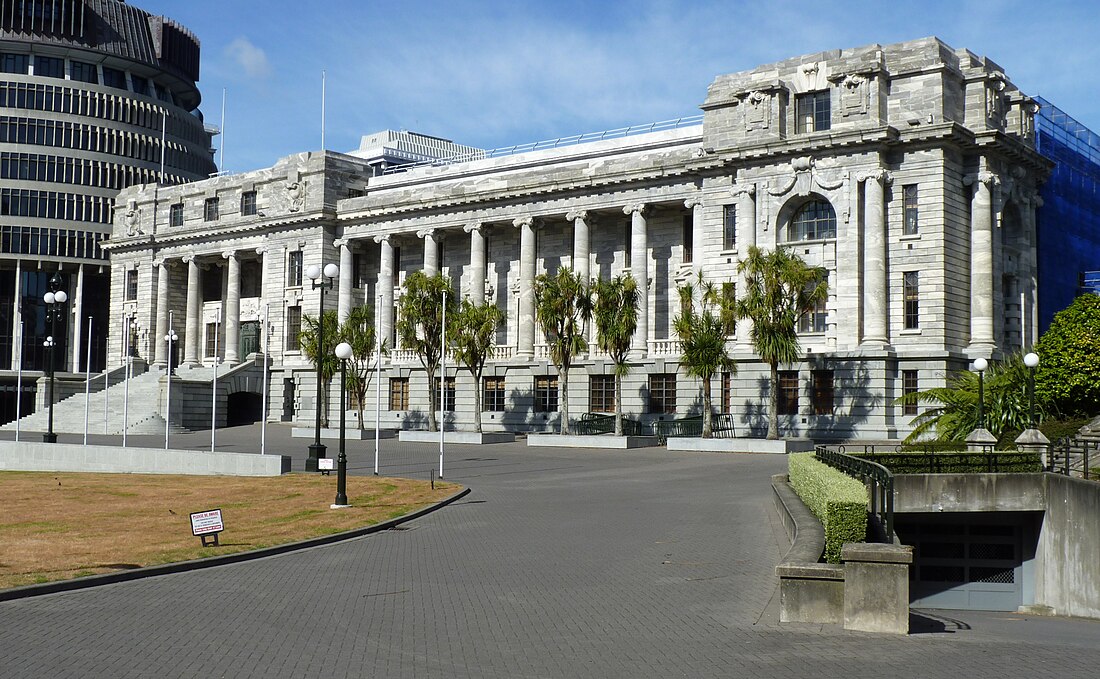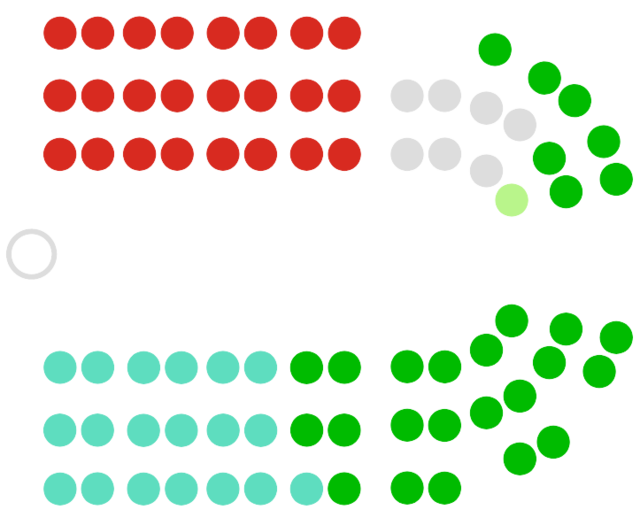Top Qs
Timeline
Chat
Perspective
24th New Zealand Parliament
Term of the Parliament of New Zealand From Wikipedia, the free encyclopedia
Remove ads
The 24th New Zealand Parliament was a term of the New Zealand Parliament. It opened on 23 February 1932, following the 1931 election. It was dissolved on 1 November 1935 in preparation for the 1935 election. The 24th Parliament was extended by one year because the 1935 election was held later than anticipated due to the ongoing depression, similarly the 1919, and the 1943 elections were held two years late, having been postponed during World War I and World War II respectively.
The Prime Minister during the 24th Parliament was George Forbes, leader of the United Party. Many commentators at the time, however, alleged that Gordon Coates, leader of the larger Reform Party, had the greater influence.
The 24th Parliament consisted of eighty representatives, each elected from separate geographical electorates.
Remove ads
Ministries
The 24th Parliament was led by a coalition of the Reform Party and the United Party;[1] Reform had twenty-eight seats, United had nineteen, and there were four pro-coalition independents. The primary opposition was from the Labour Party, which had twenty-four seats. The small Country Party had one seat, and there were four non-aligned independents. The distribution of seats between three large parties (also a feature of the previous parliament) was relatively unusual, as New Zealand tended towards a two-party system at the time.
The coalition government had been formed on 22 September 1931 during the term of the previous Parliament. During the difficult times of the Great Depression, Forbes had wanted to form a grand coalition with the Labour Party and the Reform Party. Labour refused, but Reform went into a coalition government with United from September 1931.[2][3]
Remove ads
Party standings
Start of Parliament
| Party | Leader(s) | Seats at start | |
| Reform Party | Gordon Coates | 28 | |
| Labour Party | Harry Holland | 24 | |
| United Party | George Forbes | 19 | |
| Country Party | Harold Rushworth | 1 | |
| Independents | 8 | ||
End of Parliament
| Party | Leader(s) | Seats at end | |
| Reform Party | Gordon Coates | 29 | |
| Labour Party | Michael Joseph Savage | 24 | |
| United Party | George Forbes | 16 | |
| Democrat Party | Thomas Hislop (outside parliament) | 2 | |
| Country Party | Harold Rushworth | 1 | |
| Ratana | Eruera Tirikatene | 1 | |
| Independents | 7 | ||
Remove ads
Electoral boundaries
Members
Initial MPs
The following table shows the detailed results:
Key
Reform Labour United Country Party Independent Liberal Ratana Independent
Table footnotes:
- For some biographical details of James Kerr refer to his father's article
- For some biographical details of McLachlan refer to his grandfather's article
- McMillan claimed to stand for the Reform Party, but he was not the official candidate, as the United–Reform Coalition endorsed William Polson, who ran as an Independent[26]
- Bill Sullivan was a member of the United Party, but Charles Macmillan was the official candidate of the United–Reform Coalition, hence Sullivan stood as an Independent
- Ziman was the father of John Ziman[29]
- Jull was the official candidate of the United–Reform Coalition
- Ormond was the son of John Davies Ormond and the father of John Ormond
- Four of the eight independent MPs (Connolly, Hargest, McSkimming, and Polson) were aligned with the United–Reform Coalition, and are not classified as independents by some sources.
Remove ads
By-elections during 24th Parliament
Summarize
Perspective
There were a number of changes during the term of the 24th Parliament.
Summary of changes
- Tuiti Makitanara, the United MP for Southern Maori, died on 26 June 1932. The resulting 1932 by-election was won by Eruera Tirikatene, an independent candidate associated with the Rātana religious movement.
- George Black, the independent MP for Motueka, died on 7 October 1932. The resulting 1932 by-election was won by Keith Holyoake of the Reform Party.
- James McCombs, the Labour MP for Lyttelton, died on 2 August 1933. The resulting 1933 by-election Labour victory by his wife, Elizabeth McCombs, made her the first woman to win election to the New Zealand Parliament.
- Harry Holland, leader of the Labour Party and MP for Buller, died on 8 October 1933. The resulting 1933 by-election was won by Paddy Webb, also of the Labour Party.
- Elizabeth McCombs died on 7 June 1935, twenty-two months after her husband's death, and the resulting 1935 by-election returned her son, Terry McCombs.
Remove ads
Notes
References
Wikiwand - on
Seamless Wikipedia browsing. On steroids.
Remove ads



